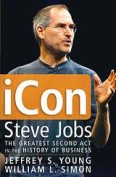
The word epic in recent years has become synonymous
with big budget B picture. What you realize watching
Lawrence of Arabia is that the word epic refers not
to the cost or the elaborate production, but to the size
of the ideas and vision.
Roger Ebert, in his Great Movies article on Lawrence of Arabia
Source: Wikipedia
Just to add another dimension to Roger Ebert’s statement, any
epic movie is also about the arduous journey of a hero with
extraordinary talents. Some of the biggest period dramas like
‘Benhur’ or ‘Gladiator’ have a three stage story telling–the rise
of the hero, his fall from grace and the phoenix like rise.Though this isn’t an article on movies, it sure does serve as a
good opening for a book review on Steve Jobs, who commands almost
a hero worship in the software and business worlds.
“iCon Steve Jobs : The Greatest Second Act in the History of Business”
chronicles the life of an epic hero and his rise n’ falls and does a pretty
neat job of it.
The book is structured into three parts–Flowering and Withering,
New Beginnings, Defining the Future. Part One is about Steve Jobs
at Apple and his unceremenious exit. Part Two describes his biggest
failure. Part three accounts his rise in the media industry.
The book offers some inside stories, specially in the Part three, where
it recounts how Steve Jobs picked up Lucas’s animation division
for a throw-away price. Overall, authors Jeffrey S. Young, William L. Simon
have done a fine job in deconstructing the persona of the Steve Jobs.
And they stay true to it even when they take a
closer look at his troubled personal life. While his corporate story
gives Steve Jobs the clothing and the mind of a super hero,
it is his personal like that gives him the flesh and blood of a
mere mortal. It is this duality and the references like that of ‘Rosebud’
that endears the readers most to this book. It makes
us remember that while it is a lot of hardwork to be a hero, it is
even more to be a human being.
Here are the last lines from the book.
We expect our heroes to be flawed. Heroes without flaws would not be
successful. Yet in the end, it’s not the flaws we need to remember but
the achievements.
Amen!
Related Links
Roger Ebert in Wikipedia

